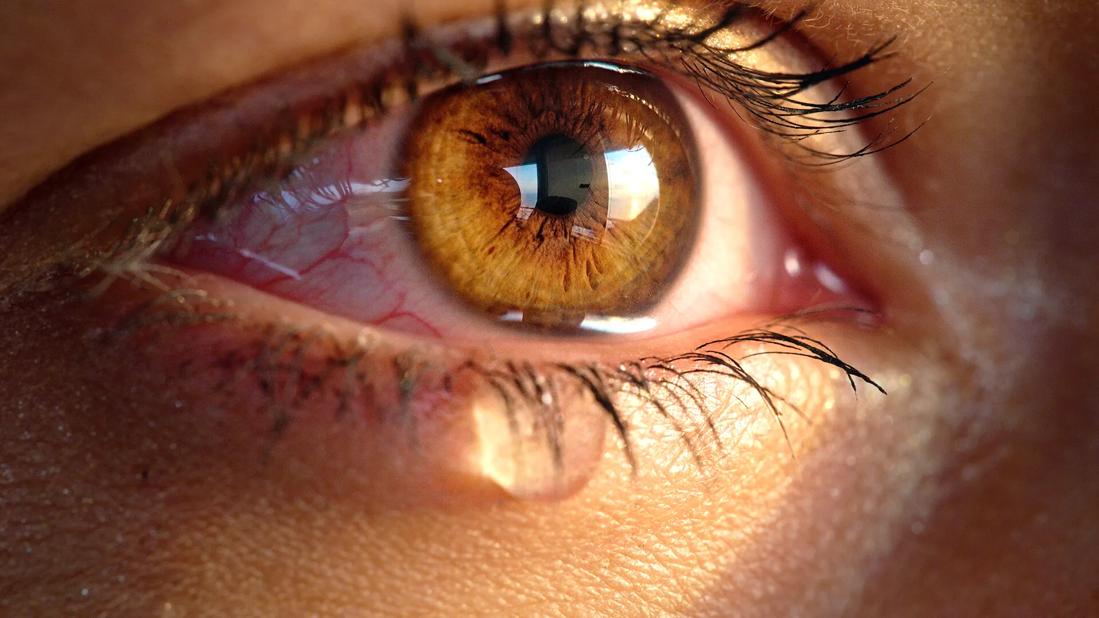Your eyes could be burning because of allergies, elevated salt levels, dry eyes and more

If your eyes burn every time you tear up, you could be dealing with allergies — but that’s not always the case. Burning tears can also be a sign that you have an underlying eye condition or that other irritants are at work.
Advertisement
Cleveland Clinic is a non-profit academic medical center. Advertising on our site helps support our mission. We do not endorse non-Cleveland Clinic products or services. Policy
Optometrist Weston Tuten, OD, explains the reasons your tears cause a burning feeling and how to stop them, without rubbing your eyes.

Image content: This image is available to view online.
View image online (https://assets.clevelandclinic.org/transform/a7225f4c-9b36-423e-9b66-4b5093d5fa0f/Tears-burn-eyes-infographic)
Tears lubricate your eyes and protect them from infection and other outside irritants like dirt or sand. They can also be a direct result of experiencing emotions.
But tears can sometimes burn if you’re dealing with any of the following.
Smoke, dust, sand and other environmental or external irritants (like soap) can cause your eyes to quickly increase their tear production. Your body produces these “reflex tears” to flush out these irritants, so they’re packed with antibodies and more salt than other types of tears. It’s this salt that causes your eyes to burn. But once the irritants are removed, your eyes tend to stop burning and return to normal.
Allergic reactions to pollen, dust and other irritants that spike during specific seasons can cause your eyes to burn and itch. As a result, you can end up with near-consistent reflex tears until you find relief by either limiting your exposure to irritants or using allergy eye drops.
When you have dry eyes, the tear film that keeps your eyes moist becomes ineffective. This happens because your tears evaporate too quickly or your lacrimal glands may not be functioning properly, causing reduced tear production. As a result, you get a stinging, burning sensation in your eyes.
Advertisement
“This is a signal for your brain to send more tears, but it can only send more watery tears,” explains Dr. Tuten. When you’re caught up in a chronic crying loop, every tear burns.
Sweat is made up of 99% water and 1% salt and other minerals. If you sweat — whether from exercise or hot weather — and it gets into your eyes, the salt can burn your eyes along with any other irritants that get pulled in with it.
Eye conditions that cause inflammation can lead to burning tears, too. A common one is blepharitis, or inflammation of your eyelids. It can result from an infection or when oil glands become clogged (so you’re more likely to get blepharitis if you have naturally oily skin).
Pink eye (conjunctivitis) can also cause burning tears and inflammation because of infections, allergens and other irritants or eye injuries.
Treatment for burning tears depends on what causes it. For immediate relief, you can use:
If it’s been a few weeks and compresses or eye drops aren’t helping, it’s time to see an eye doctor.
“If you have a blocked tear duct, you want to see a specialist to have your tear system examined,” states Dr. Tuten. “Other inflammatory problems or rheumatologic issues require stronger, prescription-strength eye drops to help combat burning tears.”
Advertisement
Learn more about our editorial process.
Advertisement

Early morning red eyes can be a sign of several conditions, like dry eyes, allergies and eye strain

See an eye specialist if your pain isn’t going away and comes with other symptoms

One is a raised yellow spot on your eye, the other is a fleshy growth

When worn incorrectly, contacts can cause or worsen dry eye symptoms

Preservative-free lubricating drops, a humidifier, sunglasses and preventive medications can help with dry eyes, no matter the season

In moderation, vitamins A, C, D, E, B12 and omega-3 fatty acids can improve and maintain your eye health

Pink eye usually refers to infectious conjunctivitis, which can look similar to allergies or other infections and eye conditions

Apply a cold compress, use antihistamine eye drops and limit salt to help reduce puffiness

Wearing a scarf, adjusting your outdoor activities and following your asthma treatment plan can help limit breathing problems

Your diet in the weeks, days and hours ahead of your race can power you to the finish line

When someone guilt trips you, they’re using emotionally manipulative behavior to try to get you to act a certain way